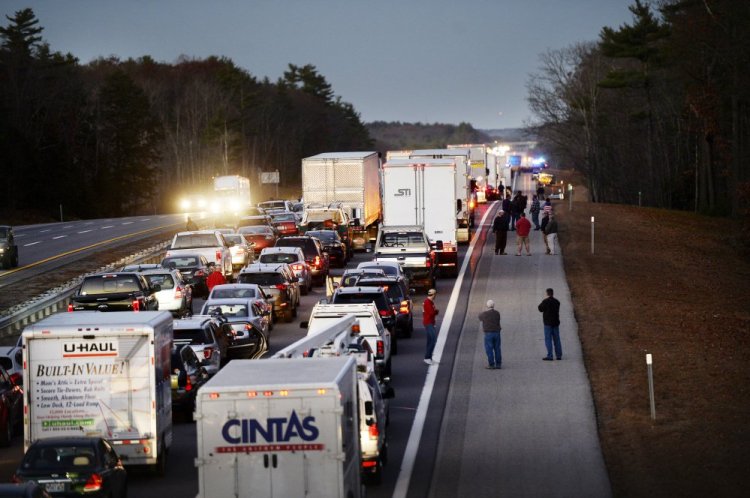The owner-operator of a Massachusetts trucking company was not permitted to drive a commercial vehicle across state lines at the time his box truck crashed into a car on Interstate 95 in York County last month, killing a man and a boy, federal officials said Friday.
Investigators at the Federal Motor Carrier Safety Administration shut down Lowell-based Kamway Services, a one-man operation run by John Kamau, 56, finding that Kamway’s violations of safety regulations were so egregious that allowing the company to continue operating would present an imminent hazard to public safety.
In addition to failing to keep even basic safety records, the agency said Kamau had not been cleared by a medical professional to be a trucker, as is required by federal law.
The action is rare and among the most severe at the regulatory agency’s disposal. Of the 550,000 commercial trucking entities in operation across the United States, regulators shutter only a couple of dozen each year, said Duane DeBruyne, spokesman for the Federal Motor Carrier Safety Administration, an agency within the Department of Transportation.
“There is only one set of safety regulations on the books, so it doesn’t matter if you’re an owner-operator, book your own loads, do your own scheduling, and drive your own rig,” DeBruyne said. “The same regulations apply to you the same way as a carrier with 10,000 trucks.”
The order, effective Dec. 20, comes roughly a month after Kamau’s truck slammed into a car as it slowed in traffic on I-95 in Wells, killing 57-year-old Earl Gray of Waterboro and 5-year-old Wyatt Frost of Lebanon.
Kamau could not be reached at numbers listed for his home, cellphone and business, and messages seeking comment were not returned.
AGENCY FINDS LACK OF COMPLIANCE
Investigators found that before the crash, Kamau failed to follow even the most basic safety and record-keeping rules designed to keep mechanically deficient trucks off the road and unqualified drivers from getting behind the wheel of the most massive and potentially dangerous vehicles that travel the public roads.
“Kamway’s complete and utter lack of compliance with (federal regulations) … substantially increases the likelihood of serious injury or death for its drivers, passengers, and the motoring public if the operation of Kamway is not discontinued immediately,” the order says.
At virtually every turn, investigators found that Kamway simply did not follow any of the rules.
Kamway should have had records on file for its driver, which typically include an employment history and application, a driver road test certificate, state driving records, documentation of past driving violations, and a medical certificate signed by a doctor that attests to a driver’s physical fitness to perform the job, as required by law.
Kamau possessed none of these documents, investigators found.
The company also failed to keep records of how many hours its driver spent behind the wheel, regulations designed to prevent drowsy or fatigued driving.
Kamway also could not provide any past records detailing the maintenance and upkeep of its sole truck, or a plan to keep the truck roadworthy in the future – all requirements to operate as an interstate trucking carrier.
CRASH SHUT DOWN HIGHWAY
The crash occurred as Kamau drove north from New Hampshire ferrying a load of mail to Portland. He had not been hired by the U.S. Postal Service, a spokesman said Friday, and may have been carrying bulk mail for a private customer.
As traffic slowed, Kamau’s truck slammed into the car in front of him, which was being driven by Gray, a volunteer who was transporting Frost for a nonprofit.
State troopers performed an extensive investigation at the scene, shutting down the highway’s northbound lanes for several hours as investigators reconstructed the impact. Investigators have not said why Kamau failed to stop in time.
Department of Public Safety spokesman Steve McCausland said Friday that the results of the investigation will be forwarded to the York County district attorney, who will determine whether criminal charges are warranted.
If Kamau violates the order to stop interstate trucking operations and doesn’t correct the company’s record-keeping and safety practices, Kamway could face combined fines of more than $50,489 and a criminal charge.
In the 18 months between when Kamau was approved by federal regulators as an interstate carrier and the Nov. 18 crash, he and his truck were inspected four times by officials in two states, part of the roughly 3.5 million annual roadside inspections that happen each year.
During the first inspection, performed March 16, 2016, in Maine, the inspector found that Kamau’s truck did not display the Department of Transportation number that corresponds with his privilege as an interstate carrier, and some of his wheel lug nuts were missing or loose. The most serious violation was that Kamau was found to be driving while he was disqualified to be a truck driver. The precise nature of his disqualification is not specified in the online database that tracks trucking carriers and drivers.
Two months later, at a follow-up inspection in New Hampshire, Kamau was found to be driving while his commercial driver’s license was suspended.
A month after that, in June, Kamau was inspected again in Maine, and once more, he was found to be driving a commercial vehicle while disqualified to do so.
At his final inspection in October, Kamau appeared to have corrected his issues.
Matt Byrne can be contacted at 791-6303 or at:
Send questions/comments to the editors.





